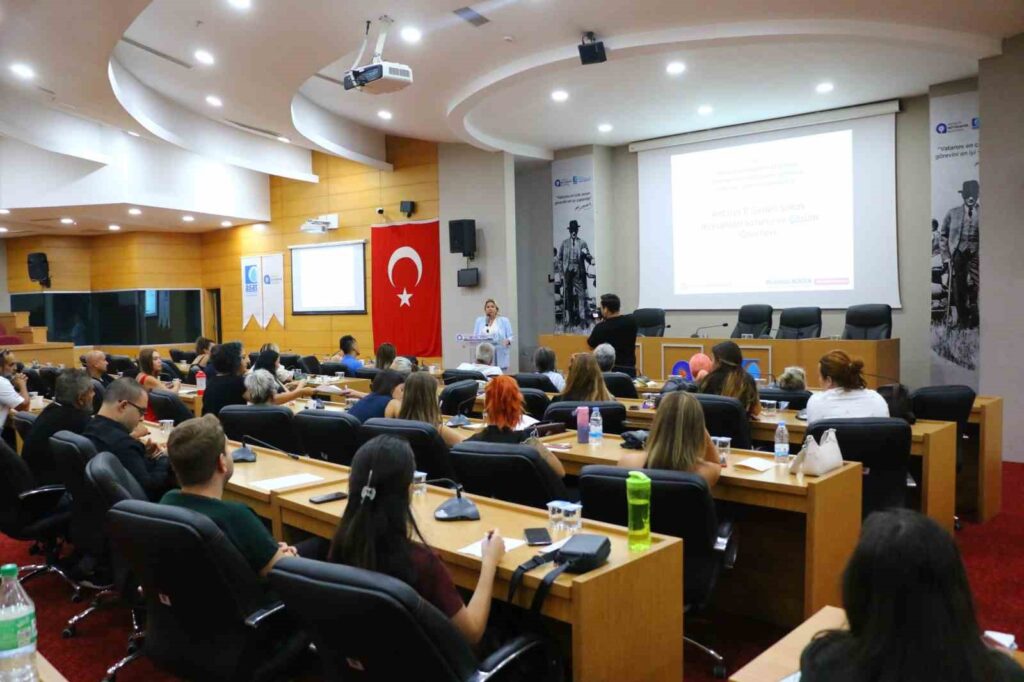They uprooted the seagrass in state protection
During the beach cleaning in the district of Erdek in Balıkesir, seagrass, which is under protection, was uprooted with excavators and piled up on the shore. Prof. Dr. Mustafa Sarı stated, “The Marmara Sea is heading towards an oxygen crisis. The most important species that will prevent this…

During the beach cleaning in the district of Erdek in Balıkesir, protected seagrasses were uprooted with excavators and piled up on the shore. Prof. Dr. Mustafa Sarı stated, ‘The Sea of Marmara is heading towards an oxygen crisis. One of the most important species communities that will prevent this is seagrasses. On one hand, due to mucilage, the oxygen in our seas is decreasing, on the other hand, we have started to harm the species that will provide this oxygen.’ Bandırma Onyedi Eylül University Faculty Member Prof. Dr. Mustafa Sarı reacted to the incident, demanding the immediate identification of those responsible and necessary legal action against them.
It was revealed that during the beach cleaning in Narlı Neighborhood, affiliated with Erdek, protected seagrasses, among important species, were uprooted with excavators and piled up on the shore. Prof. Dr. Mustafa Sarı emphasized that thousands of seagrass roots, as well as protected meadows including marine organisms, were harmed. Sarı highlighted the necessity of protecting the seagrasses of vital importance in the Sea of Marmara, urging the authorities to investigate the incident, identify the responsible parties, and initiate necessary legal proceedings.
Prof. Dr. Mustafa Sarı underlined that seagrasses have been a part of the marine ecosystem in the Mediterranean basin for 50 million years, stating, ‘They produce oxygen, they are the lungs of the sea. One square meter of seagrass area produces approximately 10 liters of oxygen. Furthermore, they are carbon reservoirs related to the climate change crisis we have been experiencing in recent years. Therefore, the greatest support to reduce our carbon emissions comes from seagrasses. On the other hand, they are reproductive, feeding, sheltering, and hiding areas for all fish and marine organisms living on the coast. Therefore, when you remove seagrass from the sea, it is as if you are tearing out the lungs of a living being. That’s why it is very important.’
‘The benefits for the marine ecosystem are countless’ Seagrasses prevent coastal erosion, Sarı explained, ‘We want to have beautiful beaches, they prevent wave erosion. They trap particles in the water, thus ensuring the clarity of the water. We cannot finish listing the benefits for the marine ecosystem; they are very valuable plant organisms. Especially in recent years, with the increase in population and industry, we observe that seagrasses weaken and are damaged due to the increasing pressures on the coastal areas above the marine area. Therefore, they are considered among the species under protection worldwide. In our country, efforts are made to protect seagrasses both in accordance with national laws and within the framework of international agreements we are party to.’
‘The Sea of Marmara is heading towards an oxygen crisis’ Sarı pointed out that there are four species of seagrasses in the Sea of Marmara, stating, ‘The species found in the Mediterranean are rarely seen in the Sea of Marmara. The currently known areas are limited to a certain region of Paşalimanı Island. One is also very limited in Erdek Narlı. The importance of seagrasses for the Sea of Marmara is slightly more critical than in other seas. The reason is that we had a terrible mucilage disaster in 2021. After this mucilage disaster, the oxygen in the depths of the Sea of Marmara started to decrease. Oxygen began to fall below critical levels. The Sea of Marmara is heading towards an oxygen crisis. One of the most important species communities that will prevent this is seagrasses. On one hand, due to mucilage, the oxygen in our seas is decreasing, on the other hand, we have started to harm the species that will provide this oxygen. The Ministry of Environment, Urbanization, and Climate Change, General Directorate of Nature Conservation and National Parks started to support the project named ‘Marçayır’ for the identification of seagrass areas in the Sea of Marmara. As a university, we are trying to identify all seagrass areas on the coasts of the Sea of Marmara within the protocol we have signed with the General Directorate of Nature Conservation and National Parks.’
‘They uprooted seagrasses under the guise of beach cleaning’ Adding that the state is currently supporting the identification and protection of seagrasses by spending money, Prof. Dr. Mustafa Sarı said, ‘Yet, on the 29th-30th of June, they conveniently planned it for the weekend. In Narlı, an unconscious group goes out, collects money among themselves, and uproots the seagrasses as if they are excavating their father’s field, under the pretext of ‘cleaning the beach’. They have no concern about beach cleaning. Their concern is to not let seaweed touch their feet. They do not care about seagrasses at all. We are facing a very sad incident. This is a special environmental protection area. If you are going to even drive a nail in a special environmental protection area, you must obtain permission from the ministry. Without informing or obtaining permission from any official institution, how can you just dig with an excavator? Don’t you have a conscience at all? The protected pines, fish fry, oysters, mussels, scallops, and dozens of other species living in the seagrasses died. We were informed that necessary legal action was taken against them. We are pleased with this. We thank all our units and institutions for this. Imposing fines is not enough. We need to publicize this. We should educate people more about the importance of seagrasses. There should be posters in our schools, on the beach. There should be boards to prevent damage to seagrasses.’







